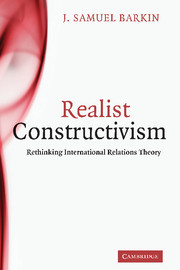9 - The limits of constructivism
Published online by Cambridge University Press: 05 June 2012
Summary
Constructivism, like realism, loses its point if stretched too far. For realism, this stretching has historically been in the direction of “science,” in an attempt to make a prescriptive theory of foreign policy into both predictive and systems theory. There are two key areas in which constructivism threatens to be stretched too far. One is in the direction of normative theory. And the other is that the term, and the concept, simply risks being spread too thin. One can think of this as a sort of diluting of the constructivist brand – if everything is constructivism, then being constructivist does not get you far.
Being stretched too thin draws on a number of points made in earlier chapters, particularly Chapters 2, 3, and 4, discussing definitions, materialism, and the logic of the social, respectively. At its most simple, the risk is that if everything that is not strictly both materialist and rationalist is defined as constructivist, then the term comes to cover almost all work in the discipline of international relations. This may be a useful political move for constructivists attempting to establish a stronger position within the discipline, but it can be a counterproductive move communicatively, because the term “constructivism,” if it applies to everyone, loses any real meaning.
Information
- Type
- Chapter
- Information
- Realist ConstructivismRethinking International Relations Theory, pp. 138 - 153Publisher: Cambridge University PressPrint publication year: 2010
